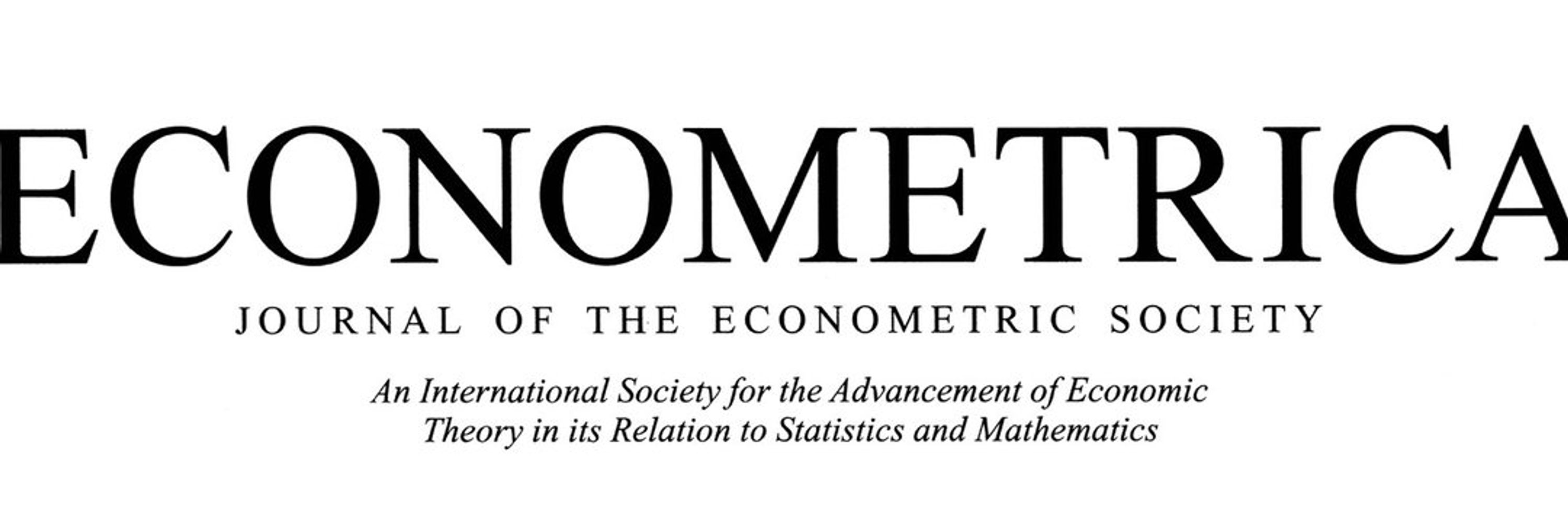
Econometrica
@ecmaeditors.bsky.social
News from the editors of Econometrica
We show how optimal partisan gerrymandering varies with electoral uncertainty. For realistic parameters, gerrymandering resembles packing-and-cracking for a gerrymanderer with minority support, and uniform districting for one with majority support. buff.ly/JZteJzL

November 10, 2025 at 2:03 PM
We show how optimal partisan gerrymandering varies with electoral uncertainty. For realistic parameters, gerrymandering resembles packing-and-cracking for a gerrymanderer with minority support, and uniform districting for one with majority support. buff.ly/JZteJzL
Macro outcomes depend on the distribution of markups across firms/time, making firm-level markup estimates key for macro analysis. Firm data with wide coverage primarily comes from financial statements. Can markups be accurately estimated with such data? buff.ly/tgD0OID

November 3, 2025 at 2:04 PM
Macro outcomes depend on the distribution of markups across firms/time, making firm-level markup estimates key for macro analysis. Firm data with wide coverage primarily comes from financial statements. Can markups be accurately estimated with such data? buff.ly/tgD0OID
A widely held view is that the Gini coefficient is not decomposable by subgroups. This paper proposes an axiomatic framework that ensures well-behaved within and between-group terms under which the Gini is decomposable with a novel and unique formula. buff.ly/XdnzG6F

October 24, 2025 at 1:05 PM
A widely held view is that the Gini coefficient is not decomposable by subgroups. This paper proposes an axiomatic framework that ensures well-behaved within and between-group terms under which the Gini is decomposable with a novel and unique formula. buff.ly/XdnzG6F
Instead of testing for bias from potential misspecification of model restrictions, it's nearly optimal to adapt, averaging restricted and unrestricted estimates using data-driven weights. shinyApp: buff.ly/MmMdwf4 Paper: buff.ly/HsuV7ep

October 15, 2025 at 1:05 PM
Instead of testing for bias from potential misspecification of model restrictions, it's nearly optimal to adapt, averaging restricted and unrestricted estimates using data-driven weights. shinyApp: buff.ly/MmMdwf4 Paper: buff.ly/HsuV7ep
Platform competition in NYC ride-hailing wastes $176M/yr and 21% of driver traffic. A merger would cut traffic by 8% but raise prices, costing consumers $77M/yr. Interoperability rules could reduce traffic by 6% and boost consumer surplus by $63M/yr. buff.ly/MeV4sJz

October 6, 2025 at 1:04 PM
Platform competition in NYC ride-hailing wastes $176M/yr and 21% of driver traffic. A merger would cut traffic by 8% but raise prices, costing consumers $77M/yr. Interoperability rules could reduce traffic by 6% and boost consumer surplus by $63M/yr. buff.ly/MeV4sJz
Many open economies face multiple frictions, including currency premia and constraints on external & domestic debt. This article links the desirability of FX intervention, capital controls and prudential limits to the mix of frictions and how they interact.https://buff.ly/5CAWDdQ

September 29, 2025 at 1:03 PM
Many open economies face multiple frictions, including currency premia and constraints on external & domestic debt. This article links the desirability of FX intervention, capital controls and prudential limits to the mix of frictions and how they interact.https://buff.ly/5CAWDdQ
Criminal organizations hinder development. In El Salvador, US deportations seeded gangs whose territorial borders trap residents. Those inside have lower income, education, and well-being than neighbors just 50m away, mainly due to restricted mobility. buff.ly/s9xz4fh

September 22, 2025 at 1:04 PM
Criminal organizations hinder development. In El Salvador, US deportations seeded gangs whose territorial borders trap residents. Those inside have lower income, education, and well-being than neighbors just 50m away, mainly due to restricted mobility. buff.ly/s9xz4fh
Economic outcomes often depend on the distribution of some maximum value (eg highest valuation, best idea, lowest cost). If the average number of options is large, how do such outcomes change when some agents have more options than others? @sephorahmangin.bsky.social buff.ly/I0CFaj4

September 15, 2025 at 1:06 PM
Economic outcomes often depend on the distribution of some maximum value (eg highest valuation, best idea, lowest cost). If the average number of options is large, how do such outcomes change when some agents have more options than others? @sephorahmangin.bsky.social buff.ly/I0CFaj4
Econometrica Volume 93, Issue 5 (September 2025) is now online
www.econometricsociety.org/publications...
www.econometricsociety.org/publications...

September 11, 2025 at 5:59 PM
Econometrica Volume 93, Issue 5 (September 2025) is now online
www.econometricsociety.org/publications...
www.econometricsociety.org/publications...
Governments use their countries’ economic strength from financial and trade relationships to achieve geopolitical and economic goals. We provide a framework of the sources and uses of geoeconomic power. Mixing macro theory and international relations. buff.ly/eyQ2yBx

September 8, 2025 at 1:02 PM
Governments use their countries’ economic strength from financial and trade relationships to achieve geopolitical and economic goals. We provide a framework of the sources and uses of geoeconomic power. Mixing macro theory and international relations. buff.ly/eyQ2yBx
From Côte d’Ivoire to the U.S., social obligations to share income are common. Eliana Carranza, Aletheia Donald, Florian Grosset-Touba and Supreet Kaur show their welfare benefits may come at a cost: lower labor supply and productivity. buff.ly/28YCYeT

September 1, 2025 at 1:03 PM
From Côte d’Ivoire to the U.S., social obligations to share income are common. Eliana Carranza, Aletheia Donald, Florian Grosset-Touba and Supreet Kaur show their welfare benefits may come at a cost: lower labor supply and productivity. buff.ly/28YCYeT
How to quantify consumer surplus in love of variety/quality ladder models? Supplier addition/separation helps identify key statistic without functional form assumptions. Crucial input for policy questions & comparative statics in growth & trade models. buff.ly/ZzOHH5B

August 29, 2025 at 1:02 PM
How to quantify consumer surplus in love of variety/quality ladder models? Supplier addition/separation helps identify key statistic without functional form assumptions. Crucial input for policy questions & comparative statics in growth & trade models. buff.ly/ZzOHH5B
U.S. municipal bonds remain illiquid; this article links this illiquidity to underwriter-driven complexity and quantifies the welfare gains from mandating standardization. buff.ly/KfH7vsT

August 27, 2025 at 1:01 PM
U.S. municipal bonds remain illiquid; this article links this illiquidity to underwriter-driven complexity and quantifies the welfare gains from mandating standardization. buff.ly/KfH7vsT
We show a long-run player who repeatedly observes private signals and takes actions can sometimes establish a reputation even when their strategy is not identified. Our result applies to games of deterrence, delegation, signaling, and Bayesian persuasion. buff.ly/NcrNE6L

August 18, 2025 at 1:08 PM
We show a long-run player who repeatedly observes private signals and takes actions can sometimes establish a reputation even when their strategy is not identified. Our result applies to games of deterrence, delegation, signaling, and Bayesian persuasion. buff.ly/NcrNE6L
Could a highly desirable agent accept a partner that a less desirable agent would reject? When matching requires search in time-changing environments, this paper proves this impossible only where more desirable agents are more patient and less risk-averse. buff.ly/S5uwd3j

August 11, 2025 at 1:05 PM
Could a highly desirable agent accept a partner that a less desirable agent would reject? When matching requires search in time-changing environments, this paper proves this impossible only where more desirable agents are more patient and less risk-averse. buff.ly/S5uwd3j
Can transparent admissions rules increase access to college? This paper shows two thirds of Texas’ Top Ten Percent Plan’s impact came from information, not mechanical effects, admitting low-income students who outperform those they displace. @adamkapor.bsky.social
buff.ly/EGdXrpO
buff.ly/EGdXrpO
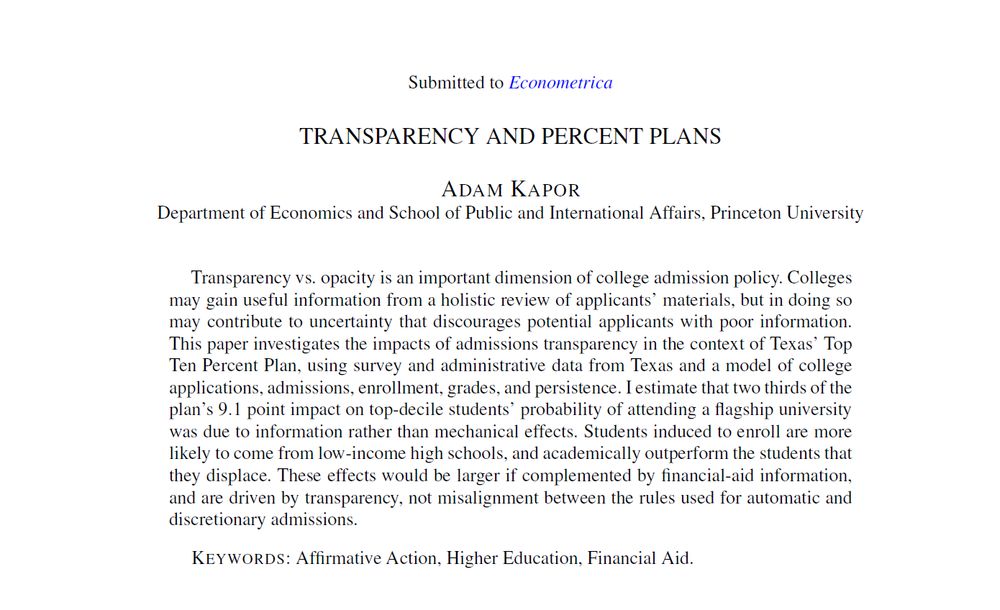
August 4, 2025 at 1:02 PM
Can transparent admissions rules increase access to college? This paper shows two thirds of Texas’ Top Ten Percent Plan’s impact came from information, not mechanical effects, admitting low-income students who outperform those they displace. @adamkapor.bsky.social
buff.ly/EGdXrpO
buff.ly/EGdXrpO
We introduce a novel experimental design and econometric model to estimate risk aversion, prudence, and temperance without imposing their interdependence. Our approach unmasks variation in risk attitudes that existing modeling approaches may obscure. buff.ly/4C38RGI
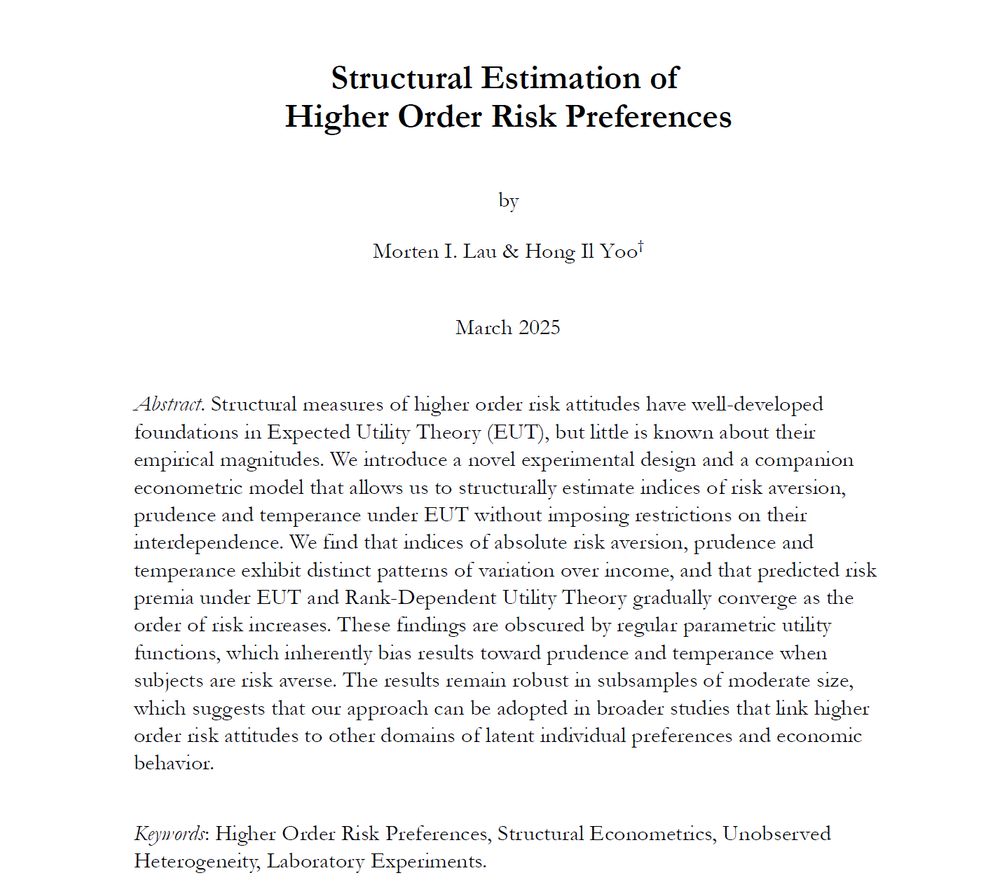
July 28, 2025 at 1:02 PM
We introduce a novel experimental design and econometric model to estimate risk aversion, prudence, and temperance without imposing their interdependence. Our approach unmasks variation in risk attitudes that existing modeling approaches may obscure. buff.ly/4C38RGI
Econometrica Volume 93, Issue 4 (July 2025) is now online
www.econometricsociety.org/publications...
www.econometricsociety.org/publications...
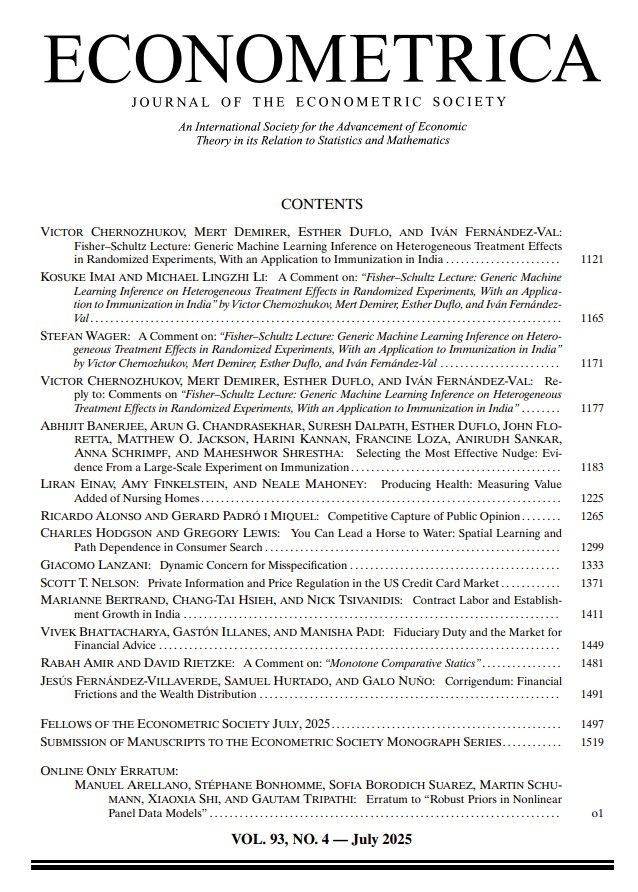
July 23, 2025 at 4:14 PM
Econometrica Volume 93, Issue 4 (July 2025) is now online
www.econometricsociety.org/publications...
www.econometricsociety.org/publications...
Can private insurance fill gaps from public disability insurance (DI) cuts? Studying a German reform, Seibold, @sseitzecon.bsky.social & @sigginho.bsky.social find modest private DI take-up, no adverse selection & efficiency gains, but an equity case for public DI. buff.ly/A0x8RSu
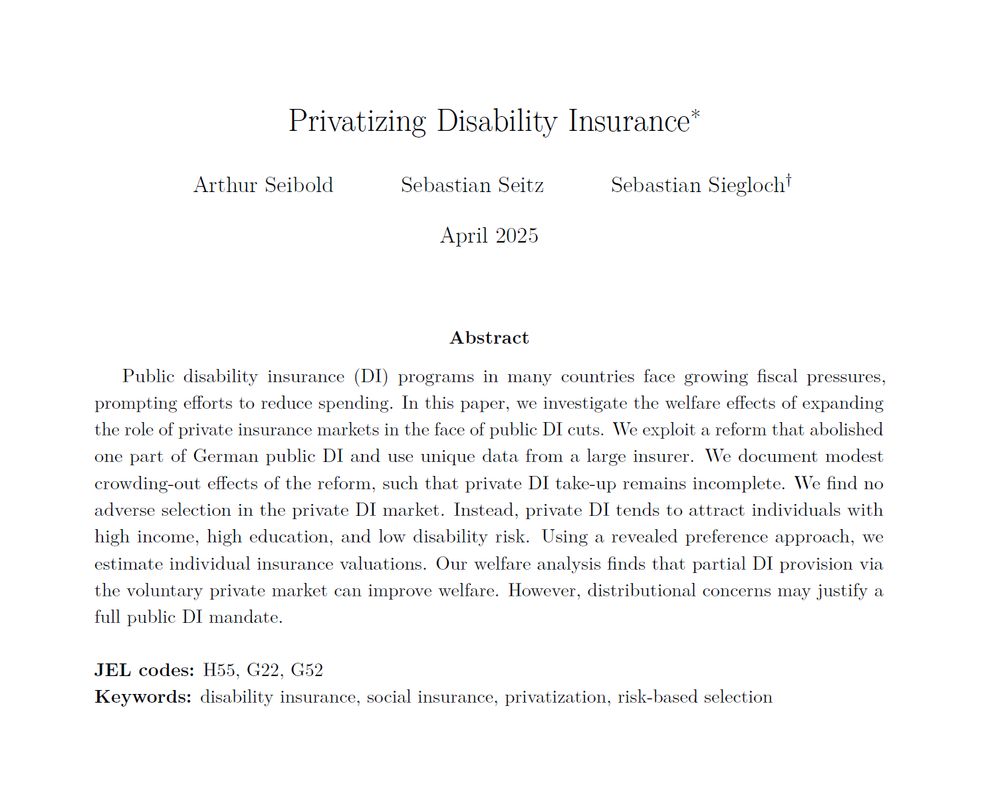
July 21, 2025 at 1:04 PM
Can private insurance fill gaps from public disability insurance (DI) cuts? Studying a German reform, Seibold, @sseitzecon.bsky.social & @sigginho.bsky.social find modest private DI take-up, no adverse selection & efficiency gains, but an equity case for public DI. buff.ly/A0x8RSu
Analyzing scientists' biographies during the baby boom, we find that mothers have a unique life cycle pattern of productivity. Children reduce the productivity of mothers but not fathers, with important implications for promotions and participation. buff.ly/39WbYRH
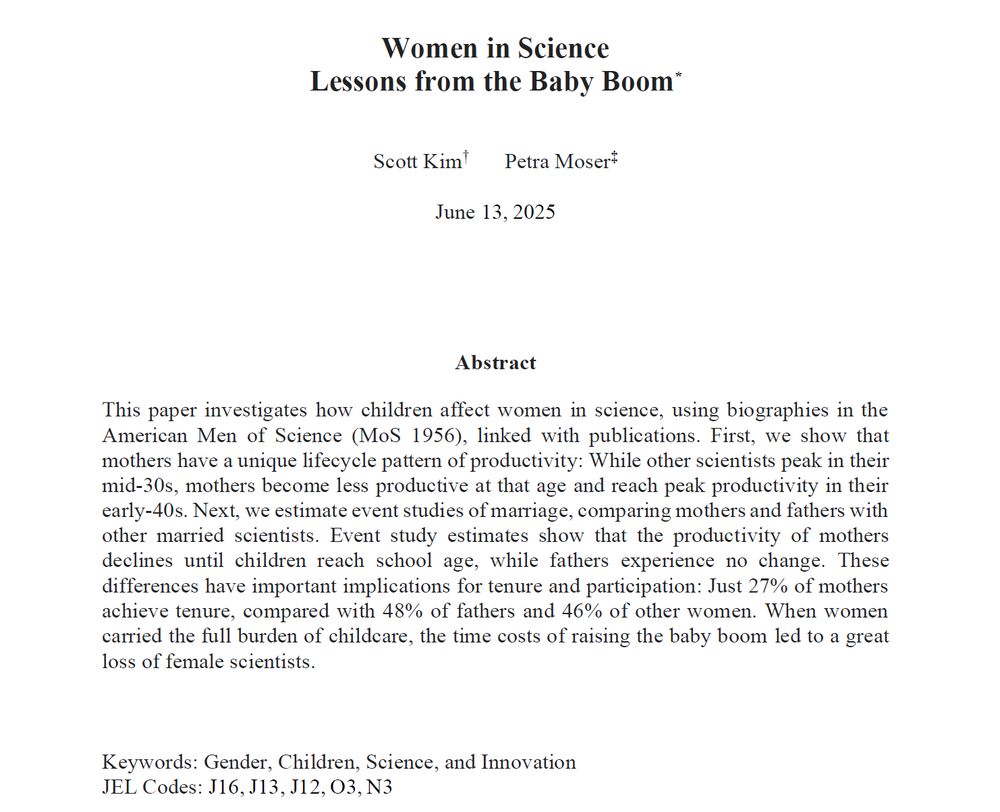
July 14, 2025 at 1:05 PM
Analyzing scientists' biographies during the baby boom, we find that mothers have a unique life cycle pattern of productivity. Children reduce the productivity of mothers but not fathers, with important implications for promotions and participation. buff.ly/39WbYRH
We study how trade policy can reduce global emissions. Unilateral carbon border taxes have limited efficacy at cutting foreign emissions. By contrast, coordinated trade penalties under a climate club prove highly effective. buff.ly/NEE3Uy8
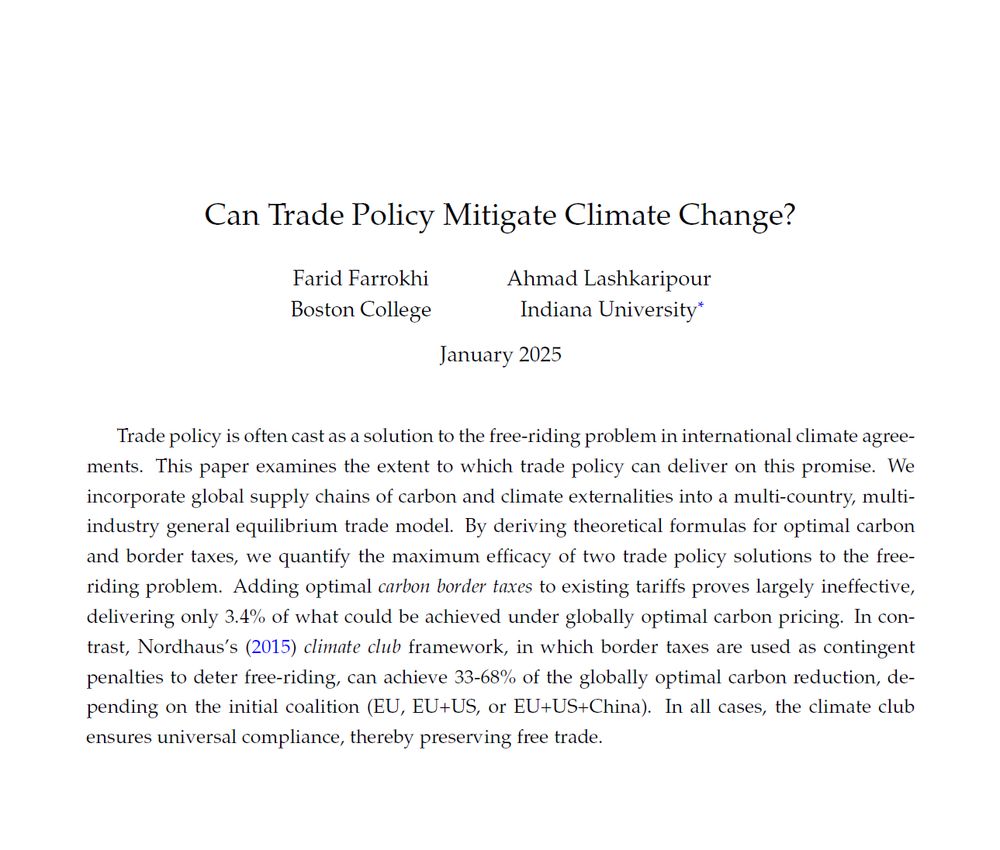
July 7, 2025 at 1:04 PM
We study how trade policy can reduce global emissions. Unilateral carbon border taxes have limited efficacy at cutting foreign emissions. By contrast, coordinated trade penalties under a climate club prove highly effective. buff.ly/NEE3Uy8
We are excited to announce that the following new associate editors with expertise in economic theory joined the editorial board of Econometrica on July 1st, 2025: Piotr Dworczak (Northwestern University), Ryota Iijima (Princeton University), and Yves Sprumont (Deakin University).
July 1, 2025 at 4:22 PM
We are excited to announce that the following new associate editors with expertise in economic theory joined the editorial board of Econometrica on July 1st, 2025: Piotr Dworczak (Northwestern University), Ryota Iijima (Princeton University), and Yves Sprumont (Deakin University).
We are excited to announce that the following new associate editors with expertise in political economy joined the editorial board of Econometrica on July 1st, 2025: Hülya Eraslan (Rice University) and Eric Weese (Tokyo University).
July 1, 2025 at 4:21 PM
We are excited to announce that the following new associate editors with expertise in political economy joined the editorial board of Econometrica on July 1st, 2025: Hülya Eraslan (Rice University) and Eric Weese (Tokyo University).
We are excited to announce the following new AEs with expertise in IO, labor, and applied micro: Francesco Decarolis (Bocconi University), Thomas Lemieux (VSE), Mathias Reynaert (TSE), Eduardo Souza-Rodrigues (University of Toronto), and Andrew Sweeting (Maryland University)
July 1, 2025 at 4:20 PM
We are excited to announce the following new AEs with expertise in IO, labor, and applied micro: Francesco Decarolis (Bocconi University), Thomas Lemieux (VSE), Mathias Reynaert (TSE), Eduardo Souza-Rodrigues (University of Toronto), and Andrew Sweeting (Maryland University)
We are excited to announce that the following new associate editors with expertise in macroeconomics and international economics joined the editorial board of ECMA on July 1st, 2025: Jennifer La'O (Columbia University), Michael Peters (Yale University), and Stephen Redding (Princeton University).
July 1, 2025 at 4:07 PM
We are excited to announce that the following new associate editors with expertise in macroeconomics and international economics joined the editorial board of ECMA on July 1st, 2025: Jennifer La'O (Columbia University), Michael Peters (Yale University), and Stephen Redding (Princeton University).

